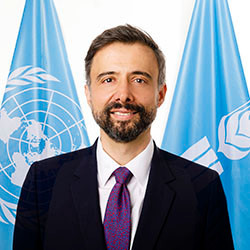International Day of Awareness of Food Loss and Waste
IFAD Asset Request Portlet
Asset Publisher
International Day of Awareness of Food Loss and Waste
Video Statement by Alvaro Lario, President of IFAD
By Alvaro Lario
Dear Colleagues
As we meet today, the world is grappling with numerous crises -- from the ongoing effects of the war in Ukraine, to the increasingly serious impacts of climate change.
These crises are impeding our effort to eliminate hunger and achieve the SDGs. They are making it more difficult to make nutritious food available to those who need it most – especially the up to 783 million people currently suffering from hunger.
But the food that is lost and wasted each year would be more than enough to feed every hungry person in the world.
Food loss and waste also account for 8-10 percent of global greenhouse gas emissions. It contributes to climate change, making it more difficult for farmers to produce food.
Let me focus on food loss.
Around 14 percent of the world's food -- valued at $400 billion per year -- continues to be lost after it is harvested and before it reaches market.
How can we change this reality? How can we transform a problem into a solution that will help us end hunger?
First, we need to recognize the causes of food loss are different for every crop and in every country. That means we need to listen to small-scale farmers and tailor solutions to their particular needs.
For example, in Rwanda an IFAD-supported projected trained farmers in the use of tarpaulins to dry their maize, and hermetic bags to store it. These simple techniques reduced losses from 18 per cent to 4 per cent. This enabled families to save the equivalent of two months’ of additional food a year.
Second, we need to invest in rural infrastructure so that farmers can get food safely and in good condition to market.
IFAD invests US$100 million per year in the improvement of post-harvest infrastructure to minimize food losses. These instruments are focused on rural access roads, improved storage facilities -- as well as processing, cooling and drying equipment.
And, third, we need to encourage the private sector investment in reducing food loss at both local and national levels. For this purpose, IFAD collaborates with private banks, microfinance institutions and the public sector to develop affordable and relevant financial instruments.
Ladies and gentlemen,
We must do more to deliver solutions to enable small-scale farmers to reduce food loss. We need to rally together on days like today, to scale-up investment, and to make sure it goes where it’s needed most – to neglected rural areas.
Together, we can reduce food loss and waste. Together we can build a world free from hunger.
Thank you very much.
